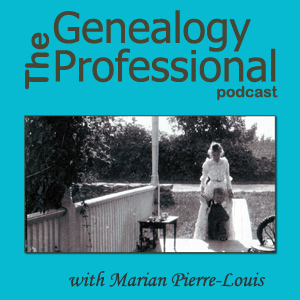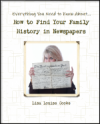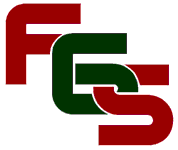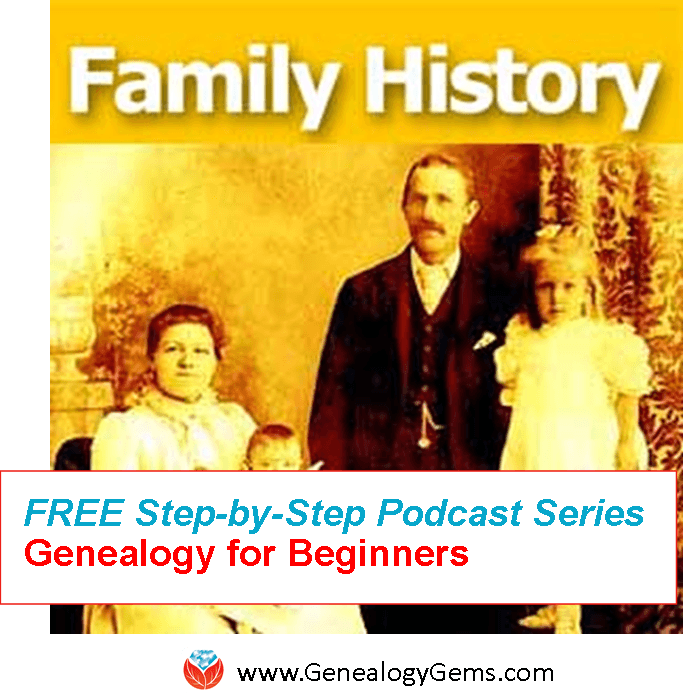by Lisa Cooke | Apr 16, 2014 | Certification
 Professional genealogist and house historian Marian Pierre-Louis is launching a new podcast called The Genealogy Professional.
Professional genealogist and house historian Marian Pierre-Louis is launching a new podcast called The Genealogy Professional.
Marian describes her new show this way: “”The Genealogy Professional podcast provides a peek behind the curtain to give up-and-coming and experienced genealogists a chance to learn from active professionals working in the field. Each show contains an interview with an active genealogy professional and provides tips and guidance related to practical aspects of business such meeting deadlines, networking, finding clients, submitting articles for publication and applying for speaking engagements.”
Like our own Genealogy Gems podcast, The Genealogy Professional podcast speaks to an international audience. Her guests have included professionals from Scotland, Ireland, Canada, Australia, Israel and the U.S. Shows are broadcast weekly (released on Mondays) through the above website, iTunes and Stitcher.
by Lisa Cooke | Apr 15, 2014 | 01 What's New, Military
Here’s your opportunity to research your Civil War ancestors for free at Fold3:
“To remember the commencement of the Civil War in April 1861, Fold3 invites you to explore all records in its Civil War Collection [http://go.fold3.com/civilwar/]for free April 14–30.
Explore Civil War documents featuring everything from military records to personal accounts and historic writings. Soldier records include service  records, pension index cards, “Widows’ Pension” files, Navy survivors certificates, Army registers, and much more. Other record types include photographs, original war maps, court investigations, slave records, and beyond. Items such as the Lincoln Assassination Papers, Sultana Disaster documents, letters to the Adjutant General and Commission Branch, and the 1860 census are also contained in the Civil War Collection.
records, pension index cards, “Widows’ Pension” files, Navy survivors certificates, Army registers, and much more. Other record types include photographs, original war maps, court investigations, slave records, and beyond. Items such as the Lincoln Assassination Papers, Sultana Disaster documents, letters to the Adjutant General and Commission Branch, and the 1860 census are also contained in the Civil War Collection.
Confederate-specific records include Confederate service records, amnesty papers, casualty reports, and citizens files, as well as Confederate Navy subject files and Southern Claims Commission documents.
Join Fold3 in its commemoration of the Civil War. Discover information on famous participants as well as your own Civil War ancestors through documents, photos, and images that capture the experiences and vital information of those involved in America’s deadliest conflict. Then commemorate your ancestors by creating or expanding memorial pages for them on Fold3’s Honor Wall [http://www.fold3.com/wall/]. Get started searching the Civil War Collection here [http://go.fold3.com/civilwar/].”
by Lisa Cooke | Apr 15, 2014 | 01 What's New, Family History Podcast, Newspaper
 If you tune in regularly to Genealogy Gems, you know I love using newspapers to learn more about my relatives. I wanted to alert you to two FREE back-to-back podcast episodes on how to find your family history in newspapers. These episodes will get you started or revitalize what you’re already doing:
If you tune in regularly to Genealogy Gems, you know I love using newspapers to learn more about my relatives. I wanted to alert you to two FREE back-to-back podcast episodes on how to find your family history in newspapers. These episodes will get you started or revitalize what you’re already doing:
Family History Made Easy: Episode 27: How to Find Your Family History in Newspapers, Part 1
Family History Made Easy: Episode 28: How to Find Your Family History in Newspapers, Part 2 (Part 2 will be published on April 22, 2014)
What have YOU found in old newspapers about your family? Share it on the Genealogy Gems Facebook page!
by Lisa Cooke | Apr 15, 2014 | 01 What's New, images, Military, Mobile, Research Skills, Video
 For a limited time, you can watch FREE genealogy webinars from the Federation of Genealogical Societies (FGS) 2014 Webinar Series. These are top-notch experts in their fields who have a lot to share. These three caught my eye:
For a limited time, you can watch FREE genealogy webinars from the Federation of Genealogical Societies (FGS) 2014 Webinar Series. These are top-notch experts in their fields who have a lot to share. These three caught my eye:
“Discovering Local and State Militia Records” by J. Mark Lowe, CG, FUGA is available only until Sunday, April 27, 2014:
So is “Researching in the Post War Records of 1812” by Craig Scott, MA, CG:
Interested in social media? Don’t miss this webinar: “Capturing the Community: Using Twitter to Connect, Engage and Educate in Genealogy” by Jen Baldwin:
Check out the full webinar series here.
by Lisa Cooke | Apr 15, 2014 | 01 What's New, Beginner, Family History Podcast, Newspaper

Listen to the Family History: Genealogy Made Easy podcast by Lisa Louise Cooke. It’s a great series for learning the research ropes and well as refreshing your skills.
Family History: Genealogy Made Easy
with Lisa Louise Cooke
Republished April 15, 2014
[display_podcast]
Download the Show Notes for this Episode
Welcome to this step-by-step series for beginning genealogists—and more experienced ones who want to brush up or learn something new. I first ran this series in 2008-09. So many people have asked about it, I’m bringing it back in weekly segments.
Episode 27: Find Your Family History in Newspapers, Part 1
Newspapers offer such a unique perspective on history in general, and our ancestors specifically. You can find everything from birth, marriage and death announcements, to school and club event, crime stories, land transactions, sports activities and just about any other activity that your ancestors were part of that made the news. So let’s get started and “Read all about it!”
In this episode, you’ll hear from Jane Knowles Lindsey at the California Genealogical Society. She is currently the president there and often teaches on this subject. Our conversation on newspaper research continues in next week’s episode!
Here are some take-away thoughts from this episode, along with some updates:
- Determine which newspapers existed for your ancestor’s hometown and time period. Look for ethnic and neighborhood papers, too. The most comprehensive U.S. newspaper directory is at Chronicling America. This site does let you search by language, ethnic background, labor group and more.
- Look for these newspapers at digitized newspaper sites, starting with the free ones. In the U.S., this means starting with Chronicling America and state digital newspaper project sites (search on the state name and “digital newspapers”). These sites came out of the government digitizing program mentioned in the show.
- Digitized newspaper searching is done with OCR (optical character recognition), which doesn’t pick up everything in tough-to-read historical print. Try searching with different spellings, a first name in a particular timeframe, or other people or terms that may have been mentioned.
- Ancestry has put lots of newspapers on their website—but not everything, and for only limited time periods. Notice what time period is covered for a specific newspaper. Ancestry has since launched Newspapers.com.
- If you’ve found the name of a newspaper that probably covered your family, but you haven’t found it digitized, search the name of the newspaper in your favorite web browsers. Most newspapers are on microfilm somewhere and web directories will likely list holdings. Also, some newspapers have also been indexed on USGenWeb or other sites.
- State archives and libraries are often a great resource for newspapers. Local libraries may have unique clippings files or scrapbooks.
- Several websites and databases now focus on obituary content. You can target a search for these.

Available at http://genealogygems.com
I loved this topic so much I ended up writing a book on it! How to Find Your Family History in Newspapers walks you through the process of finding and researching old newspapers. You’ll find step-by-step instructions, worksheets and checklists, tons of free online resources, websites worth paying for, location-based newspaper websites and a case study that shows you how it’s done.
More Newspaper Links
Some of the digital newspaper collections mentioned in the episode are available by library subscription, like The Early American Newspapers collection the and 19th century Newspaper Collection from The Gale Group. Check with your local library.
Fold3.com (formerly Footnote.com)
GenealogyBank
Godfrey Memorial Library
New England Historic Genealogical Society (by subscription only)
Newspapers.com
Small Town Papers
USGenWeb
 Professional genealogist and house historian Marian Pierre-Louis is launching a new podcast called The Genealogy Professional.
Professional genealogist and house historian Marian Pierre-Louis is launching a new podcast called The Genealogy Professional.
 records, pension index cards, “Widows’ Pension” files, Navy survivors certificates, Army registers, and much more. Other record types include photographs, original war maps, court investigations, slave records, and beyond. Items such as the Lincoln Assassination Papers, Sultana Disaster documents, letters to the Adjutant General and Commission Branch, and the 1860 census are also contained in the Civil War Collection.
records, pension index cards, “Widows’ Pension” files, Navy survivors certificates, Army registers, and much more. Other record types include photographs, original war maps, court investigations, slave records, and beyond. Items such as the Lincoln Assassination Papers, Sultana Disaster documents, letters to the Adjutant General and Commission Branch, and the 1860 census are also contained in the Civil War Collection. If you tune in regularly to Genealogy Gems, you know I love using newspapers to learn more about my relatives. I wanted to alert you to two FREE back-to-back podcast episodes on how to find your family history in newspapers. These episodes will get you started or revitalize what you’re already doing:
If you tune in regularly to Genealogy Gems, you know I love using newspapers to learn more about my relatives. I wanted to alert you to two FREE back-to-back podcast episodes on how to find your family history in newspapers. These episodes will get you started or revitalize what you’re already doing:





